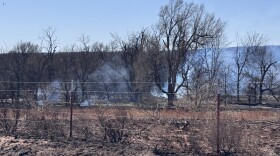As part of a larger push to eliminate federal climate change efforts, Trump drafted a budget proposal that would effectively sink the country’s leading weather and climate research team.
The Office of Oceanic and Atmospheric Research (OAR) would be scrapped, according to several reports, and NOAA would see its overall budget shrink from about $6.1 billion to $4.5 billion.
“At this funding level, OAR is eliminated as a line office,” the document states, according to the journal Science and other publications.
Climate research grant programs would be cut along with the collection of regional climate data. The document calls for terminating “all funding for climate, weather and ocean laboratories and cooperative institutes housed primarily at major research universities,” writes Politico’s E&E News.
That could mean millions of dollars cut from the University of Oklahoma’s Cooperative Institute for Severe and High-Impact Weather Research and Operations (CIWRO).
CIWRO’s research covers weather radar operations, storm and forecast modeling, extreme weather events and more. The institute, housed within the National Weather Center, employs 227 workers. An OU spokesperson said the school is in contact with its federal partners about its shared research goals.
It received $208 million in October 2021 to fund its work until September 2026. Should the budget proposal be approved by Congress, the institute would likely be nonfunctional after its latest award end date.
Also on the chopping block is the Southern Climate Impacts Planning Program (SCIPP) which employs about 20 people in Oklahoma and Louisiana. The organization conducts research and helps towns and cities adapt to extreme weather.
The SCIPP team located at the NWC has worked with communities on drafting hazard mitigation plans, a stepping stone to getting funding for federal disaster assistance. It provided weather data and analysis to Oklahoma City for its 2023 heat mapping project, which studied the city’s extreme heat and provided resources for residents.
Norman-based meteorologist Alan Gerard, who spent decades with the National Weather Service and NOAA’s National Severe Storms Laboratory, said the budget cut would have significant effects on Oklahoma’s longstanding weather and climate work.
“The combined loss of CIWRO and SCIPP would have far-reaching negative impacts on OU and Norman's position as one of the preeminent global centers of meteorological science and research—along with the very real implications of the loss of jobs and research funding for the university and community,” he said.
It’s unclear if the National Severe Storms Laboratory (NSSL) would be impacted. The NSSL is a partner of CIWRO and provides support for the National Weather Service, which is reportedly spared in the budget proposal.
The Trump administration also announced it’s ending funding for a 35-year-old Congress-mandated climate project. The National Climate Assessment is a comprehensive document detailing how climate change is affecting regions across the country.
The 2023 report documented the impacts of drought on Oklahoma industries, how extreme weather is decreasing crop yields, the actions spurring climate mitigation in the plains and more.
StateImpact contacted the office of Oklahoma U.S. Rep. Tom Cole—who chairs the House Appropriations Committee—about the proposed cuts to NOAA but did not receive a reply.
StateImpact Oklahoma is a partnership of Oklahoma’s public radio stations which relies on contributions from readers and listeners to fulfill its mission of public service to Oklahoma and beyond. Donate online.
Copyright 2025 KGOU







